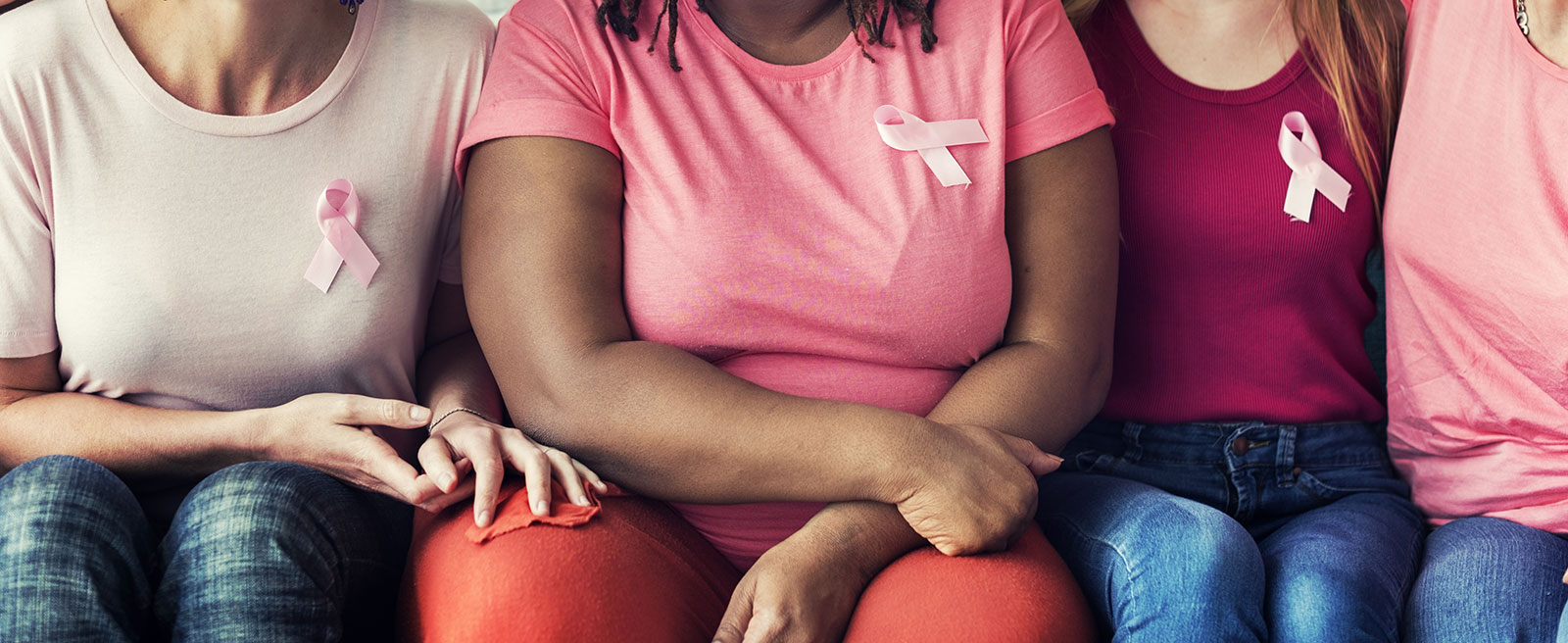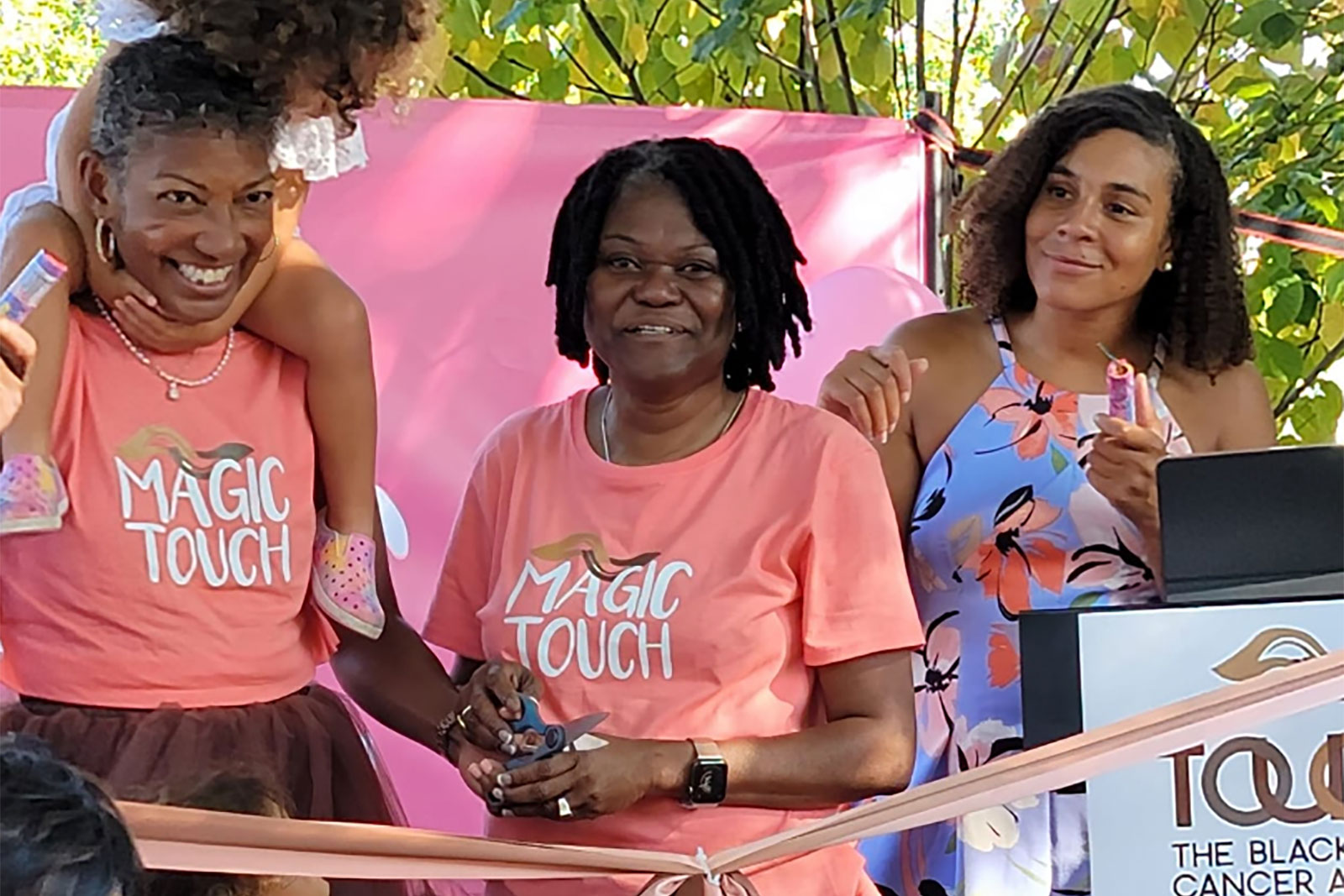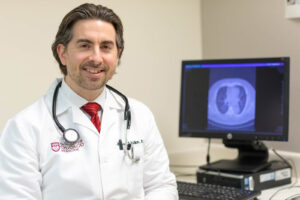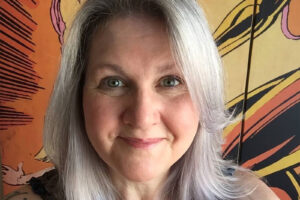Ricki Fairley, CEO and cofounder of TOUCH, The Black Breast Cancer Alliance, lives and works by the golden rule: Treat others as you want to be treated. More than a decade ago, Fairley was diagnosed with triple-negative breast cancer (TNBC) and given two years to live, but now 11 years into survivorship, she’s just getting started. She founded TOUCH in 2020 — a practice of her golden rule, even if just in foresight — when she realized she needed to fill an obvious lack in the traditionally white-centric breast cancer space.
Before founding TOUCH, Fairley became aware of some startling breast cancer statistics. “I had been working in the space as an advocate since I was sick, but I started to look at the numbers for Black women, and they’re devastating,” Fairley says. Black women are twice as likely to be diagnosed with TNBC (an aggressive form of breast cancer that is difficult to treat) than white women, and once diagnosed with breast cancer, Black women have a 41% higher mortality rate and a 39% higher recurrence rate than white women. “We started digging back to see if Black women were included in the clinical trials of the drugs that are standard of care [for breast cancer], and we were not,” Fairley remembers. “So I said, ‘Something’s got to be done here.’”
She got in touch with her friend, Valarie Worthy, who had an idea. Worthy was on the board of directors for a nonprofit started 15 years earlier by a fellow TNBC breastie, Wanda Hall McCullough, called Wanda’s TOUCH. Worthy maintained the foundation after McCullough passed away, until handing it over to Fairley in 2020. “When I told her my vision she said, ‘Here’s a 501c3 for you; you have it,’” Fairley says. “[Then] we went to work.”
TOUCH was founded on the hope that one day, foundations like TOUCH will help eradicate Black breast cancer. “We don’t want anyone to die from breast cancer,” Fairley says, “but we at least want mortality rate parity for Black women.” And the first step in getting there, according to Fairley, is to “change the science.”
Fairley notes Black women make up less than 3% of breast cancer clinical trial participants. “Frankly, the drugs aren’t working for us,” Fairley says. “In order to get better drugs, we needed Black women and Black bodies in the clinical trials, in the research.” This is a significant part of TOUCH’s mission — to increase Black women’s participation in trials testing drugs that very well may save their life. And thus, TOUCH’s first campaign, When We Tri(al), was born.
When We Tri(al) makes direct connections with the community to educate and empower Black women for increased representation in clinical trials. Fairley says it’s not enough for Black women to participate at a level commensurate with population, but the burden of disease — again, she notes the TNBC diagnosis rate is three times that of white women. “That should be the number we use to calculate who should be in the clinical trial for TNBC drugs,” Fairley says.
Fairley notes myriad reasons why participation levels are low — first and foremost, doctors are not inviting Black women to participate, either due to implicit bias or blatant racism, says Fairley. And how can we address this deep-seated and egregious problem? Fairley goes straight to big pharma.
When We Tri(al)’s slick marketing has landed Fairley media appearances at places like “The Today Show,” “Oprah Daily,” Dennis Quaid’s “Viewpoint” and more, increasing TOUCH’s reach and helping Fairley make connections across the pharmaceutical industry. “I’m sitting at that table, and I’m holding my knife and my fork [and] I’m not moving until we get better drugs,” Fairley says. “Now we have a voice with pharma to help influence some of their work to get better drugs for Black women.” Whether she’s on a three-hour phone call with AstraZeneca or inviting pharmaceutical reps to TOUCH’s in-person events, Fairley and her team are demanding better treatments for Black women. They’re even working with a company to help design a clinical trial, which includes developing a logo, writing the recruiting materials and helping patients navigate the trial once they’ve agreed to participate.
But lack of access is just one reason for the low participation rates. Medical mistrust — developed from centuries of abuse at the hands of the medical industry — means that Black women are reluctant to be part of research studies, but Fairley knew there was more to the story. There was “something within the mind of a Black breastie that was preventing her from participating,” Fairley says. So she teamed up with a friend to conduct a study with 300 Black breasties to help TOUCH better understand how to increase these participation levels. And they learned a lot.
“There’s a severe fear of the unknown. They don’t understand how a trial works. [They think], ‘I’m going to get the sugar pill and die. I don’t want to be a guinea pig,’” Fairley says. But simplifying the information and having it delivered by a fellow Black breastie is the key to alleviate these fears. “I learned pretty quickly [that] I could convince a breastie who was sick to do a clinical trial in five minutes,” Fairley says. “We built WhenWeTrial.org [to] deliver the message for Black women, by Black women, about Black women.” Then, TOUCH hit the road, visiting over 25 U.S. cities from May to November 2022 to connect directly with the community, meeting women where they “live, work, play, pray and slay,” Fairley says. And it was immensely effective — in those six months, TOUCH signed up more than 5,000 Black women into clinical trial ports. “[But] it’s a drop in the bucket of where we need to be,” Fairley says.

TOUCH’S new campaign, which launched Jan. 31, 2023 with the help of their Mission Partner, Bright Pink, is focused on connecting with a younger generation of Black women to help start them on a proactive breast health journey. For the Love of My Gurls is designed to “take the scariness out of cancer [and] make it into this regular thing,” says Hayley Brown, TOUCH’S director of programs and partnerships (and Fairley’s daughter).
With a target demographic of young Black women ages 18 to 35, For the Love of My Gurls is a resource for many stages of life. “We’re in the young women’s space [to] move the needle on this disease state, seeing that Black women under 35 are diagnosed at twice the rate [of white women], well before they would ever reach their first mammogram,” says Emily Powers, TOUCH’s director of strategy and storytelling. The campaign’s mission is to “change the data; change those numbers,” says Brown. “We also want young women to understand their herstory,” she says, so they can take precautionary steps based on shared health history.
The new campaign will also repurpose one of TOUCH’s most popular resources, a weekly show called “The Doctor Is In.” Hosted on BlackDoctor.org (the “WebMD for Black people,” according to Fairley) this show provides a platform for education and conversation about everything related to Black breast cancer, and is hosted by Fairley and Dr. Monique Gary, a breast surgical oncologist. For the Love of My Gurls will bring the popular show to the younger set, focusing on health issues relevant to young Black women and hosted by Brown and a breast surgical oncologist who also falls in the campaign’s targeted age range.
All of the resources they provide and all of their efforts to find commensurate representation of Black women in the breast cancer space aligns with TOUCH’S philosophy — that to create sustainable, empowered change, you must seek to build the agency, health literacy and self-advocacy of Black women. They do this, in part, with the power of storytelling. “The entire erasure of the experience of the community we work for means that storytelling and representation [are] actually instrumental in getting services, in promoting awareness, in meeting the needs of the community,” Powers says. “As soon as Ricki founded TOUCH, that was a central tenant — [to] start from the stories of the community and build out all of these resources and all of these needs from there.”
“The status quo is not working for black women,” Fairley says. “We have to change things and we have to be different. We live in this world of health and equity — there is no equity here.” Fairley’s reminder to treat others how you want to be treated is a good practice to live a happy and productive life, but for Black women especially, it’s a sentiment that will help save more lives. “If everybody in our ecosystem woke up with that thought and that simple premise every day, we would have different outcomes in health,” says Fairley.
Learn more about TOUCH by visiting TOUCHBBCA.org, WhenWeTrial.org and LoveOfMyGurls.org, or visit them on Instagram: @TOUCHBBCA







